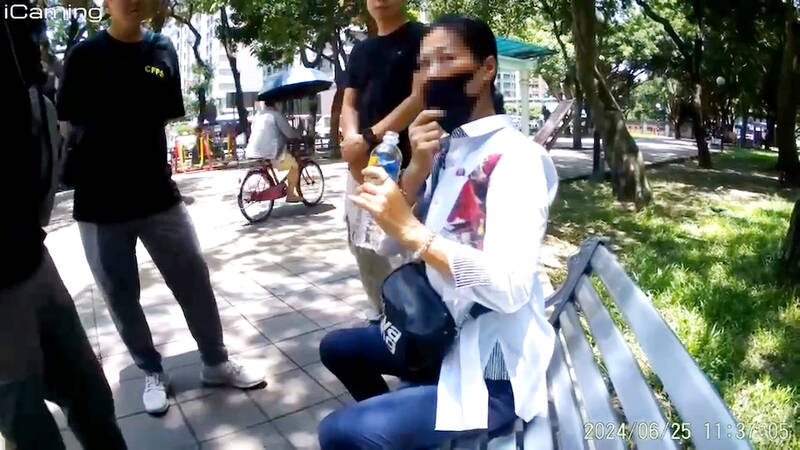A woman in New Taipei City was defrauded of NT$2.64 million (US$81,116) by scammers who used artificial intelligence (AI) apps to deceive her into believing that she was interacting with Hong Kong entertainer Andy Lau (劉德華).
The New Taipei City Police arrested a women believed to be part of the scamming operation, after the victim, a women surnamed Lin (林), and her family members reported their suspicion that Lin had been scammed.
Lin, 62, was quoted by the police as saying that she is a long time fan of Lau, who flourished in the Hong Kong film and entertainment business in the 1980s and 1990s.

Photo copied by Hsu Sheng-lun, Taipei Times
She said the scamming started last year when she visited what she believed was Lau’s personal fan Web site, and that a few minutes later, she received a message form someone claiming to be Lau.
Lin said she did not believe it was him until she had a video call with him, her statement to the police showed.
Lin said that “Lau” spoke to her about coming to Taiwan in the summer, and would need NT$2.6 million to pay for accommodation, security, dinner and other expenses, adding that he told her that he is asking fans to donate money to make the visit happen.
Lin borrowed money and wired NT$2.64 million to the bank account “Lau” provided her.
Lin’s family members were suspicious that it was a scam, and took her to the local police precinct to report it.
The police said it was a fake, using AI to generate Lau’s voice, face and movements.
To catch the scammers, the police asked Lin to ask them if she could make a NT$150,000 payment in cash in person. She arranged with the scammers to meet at a park in Sanchong District (三重) last week.
A woman surnamed Chuang (莊) showed up at the public park to receive the cash, and was arrested by plainclothes police officers.
At first, Chuang said she was a member of staff of Lau’s publicity firm, but could not answer any follow up questions in any detail.
Police said she admitted that she was instructed to collect the money, but denied it was part of a scamming operation.

Taiwan is stepping up plans to create self-sufficient supply chains for combat drones and increase foreign orders from the US to counter China’s numerical superiority, a defense official said on Saturday. Commenting on condition of anonymity, the official said the nation’s armed forces are in agreement with US Admiral Samuel Paparo’s assessment that Taiwan’s military must be prepared to turn the nation’s waters into a “hellscape” for the Chinese People’s Liberation Army (PLA). Paparo, the commander of the US Indo-Pacific Command, reiterated the concept during a Congressional hearing in Washington on Wednesday. He first coined the term in a security conference last

Prosecutors today declined to say who was questioned regarding alleged forgery on petitions to recall Democratic Progressive Party (DPP) legislators, after Chinese-language media earlier reported that members of the Chinese Nationalist Party (KMT) Youth League were brought in for questioning. The Ministry of Justice Investigation Bureau confirmed that two people had been questioned, but did not disclose any further information about the ongoing investigation. KMT Youth League members Lee Hsiao-liang (李孝亮) and Liu Szu-yin (劉思吟) — who are leading the effort to recall DPP caucus chief executive Rosalia Wu (吳思瑤) and Legislator Wu Pei-yi (吳沛憶) — both posted on Facebook saying: “I

The Ministry of Economic Affairs has fined Taobao NT$1.2 million (US$36,912) for advertisements that exceed its approved business scope, requiring the Chinese e-commerce platform to make corrections in the first half of this year or its license may be revoked. Lawmakers have called for stricter enforcement of Chinese e-commerce platforms and measures to prevent China from laundering its goods through Taiwan in response to US President Donald Trump’s heavy tariffs on China. The Legislative Yuan’s Finance Committee met today to discuss policies to prevent China from dumping goods in Taiwan, inviting government agencies to report. Democratic Progressive Party Legislator Kuo Kuo-wen (郭國文) said

The Ministry of Economic Affairs has fined Taobao NT$1.2 million (US$36,900) for advertisements that exceeded its approved business scope and ordered the Chinese e-commerce platform to make corrections in the first half of this year or its license would be revoked. Lawmakers have called for stricter supervision of Chinese e-commerce platforms and more stringent measures to prevent China from laundering its goods through Taiwan as US President Donald Trump’s administration cracks down on origin laundering. The legislature’s Finance Committee yesterday met to discuss policies to prevent China from dumping goods in Taiwan, inviting government agencies to report on the matter. Democratic Progressive Party